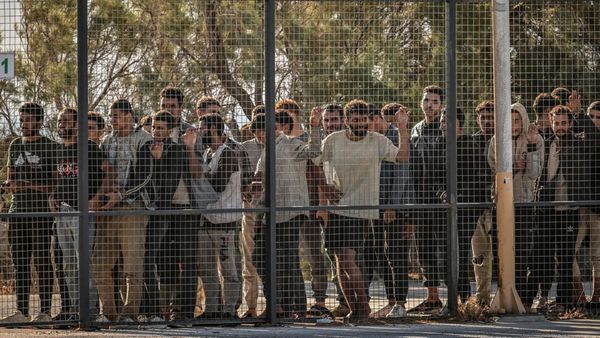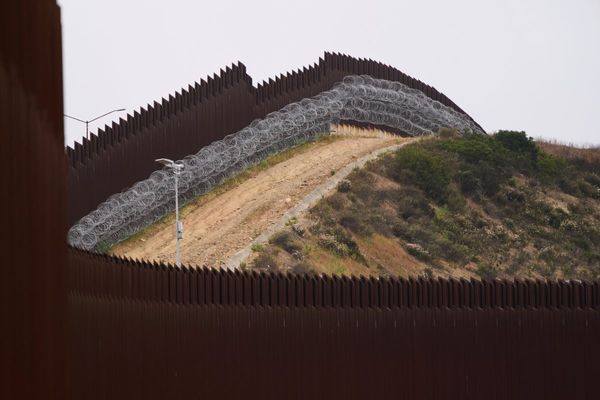
The psychiatrist who treated Joel Cauchi for schizophrenia says his stabbing attack that killed six people in a Sydney shopping centre was not caused by psychosis but likely due to his sexual frustrations and “hatred towards women”.
The Queensland doctor, known only as Dr A, told an inquest on Tuesday that her former patient could not have had a psychotic episode at the time of the 2024 murders because his psychosis had previously exhibited as extreme disorganisation to the point he couldn’t put “two words together”.
“That was nothing to do with psychosis,” the psychiatrist told the New South Wales coroners court. “He couldn’t have organised himself to do what he did. I think it might have been due to his frustrations, sexual frustration, pornography and hatred towards women.”
Cauchi, 40, killed Ashlee Good, 38, Jade Young, 47, Yixuan Cheng, 27, Pikria Darchia, 55, Dawn Singleton, 25, and Faraz Tahir, 30, and injured 10 others at Westfield Bondi Junction on 13 April last year, before he was shot and killed by police inspector Amy Scott.
Dr A also said that Cauchi’s mother’s concerns about her son’s possible schizophrenic relapse when off psychotropic medication in late 2019 – including that he believed he was under Satanic control, had extreme OCD, compulsively used porn and changed his gait – were not early warning signs but the result of stress linked to a sexually risky encounter.
She said Cauchi attributed his distress to believing he had contracted HIV after visiting a sex worker. “It was based on his fear of STD,” she said.
At first, she believed the concerns were early warning signs of relapse and, accepting his mother’s concerns at “face value”, provided him with a prescription of the antipsychotic medication Abilify the next day.
“I erred on the side of safety and I thought it was the early warning signs of relapse,” she said.
Later, Cauchi told her that he was sexually frustrated and fearful about contracting HIV from the prostitute.
He did not take the medication, and was not psychotic, the doctor said, adding that the medication in hindsight was “not necessary”.
“She is a beautiful, beautiful mother but she is not a psychiatrist,” Dr A said.
The court heard on Monday that Cauchi wrote to his health clinic in November 2019 asking for help to limit his porn exposure: “Can we please cover some ideas for a porn free phone … I want a totally porn free internet on my devices.”
Dr A told the coroners court in Lidcombe she treated Cauchi in her private Queensland practice from 2012 to 2020.
“I would like to say to the victims, their families, Joel Cauchi’s parents, friends and everybody, that I offer my sincere apologies to you all,” the acute mental health expert said on Tuesday.
“I’m sharing the pain, it has devastated me personally. No psychiatrist in the world would wish on themselves for this trauma to happen.”
The court on Tuesday was exploring why Cauchi was weaned off his psychotropic medication by 2019 and disengaged from medical care after 2020.
When Dr A first saw Cauchi, he reported mental slowness, did not complain of depression, was guarded about his psychotic experiences and open about his poor organisation skills, she said.
She initially diagnosed him with chronic paranoid and disorganised schizophrenia, then later modified the diagnosis to first episode schizophrenia.
Under questioning by senior counsel Dr Peggy Dwyer SC, the court heard there was some ambiguity about whether the new diagnosis meant Cauchi’s schizophrenia was chronic and susceptible to the same rates of relapse.
“In my mind, he was suffering a long episode of first episode schizophrenia,” Dr A said. “Let’s just move on because it is first episode in my mind.”
She said she “hoped” Cauchi would not relapse to the “terrible” disorganisation, lack of self-care and paranoia symptoms he had when he first developed and was hospitalised for schizophrenia at the age of 17 around 2001.
‘He was so, so troubled by the side effects’
He was taking 550mg of Clopine (clozapine) when he joined the private clinic in February 2012 and had been taking the drug for 10 years previously under the care of public health doctors.
On being transferred to the private system, Dr A’s strategy was to ascertain whether his “negative” symptoms, including a blunting effect, lack of joy and amotivation, were caused by the illness or the medicine’s side effects.
Cauchi was concerned he was over-medicated. “He was so, so troubled by the side effects,” his former psychiatrist said.
Through assessments, she wanted to find “out what was really going on”, she said. They decided on a plan to lower Cauchi’s clozapine dose and find an optimal level that balanced his wellness with the drug’s side effects.
In 2015, Dr A approached a psychiatrist from outside the practice for a second opinion on the plan to lower his clozapine dosage. In a letter shown to the court discussing that meeting, the second psychiatrist said they and Cauchi had discussed the risks and benefits of stopping clozapine.
On balance, Cauchi said he wished to continue the slow reduction in the dosage.
He agreed that if there was any recurrence of psychosis, the reduction would likely need to be reversed. His mother agreed to support him through the gradual reduction.
It was agreed that family members were most likely to recognise early signs of relapse.
Dr A said the plan was not to take Cauchi off medication altogether and that he would need to take drugs to control his schizophrenia for the duration of his life.
But, in 2018, Cauchi stopped taking Clopine and he ended his OCD medication, Abilify, in 2019.
Dr A did not seek a second opinion when ceasing to prescribe the drugs altogether, the court heard.
“I was very confident that he had recovered from the first episode schizophrenia,” she said.
When asked whether she took responsibility for Joel coming off Clopine and Abilify, she said: “It was my decision and his decision.”
On Monday, the court heard that despite Cauchi’s mother’s concerns about a relapse after he came off clozapine, he was not put back on to the medication.
“During my eight years of treatment, he never showed any signs of positive symptoms, never showed signs of any relapse and never showed signs of any issues of safety,” or any interest in weapons, Dr A said on Tuesday.
“Positive” symptoms include delusions, catatonia and disorganised speech and behaviour.
Dr A told the court that Cauchi’s father had schizophrenia and that the illness was hereditary.
‘I have no error on my behalf’
Cauchi continued seeing Dr A after he stopped taking medication because, she said, she wanted to support him while he moved out of the family home into his own unit.
“He was going through transitions … I wanted to see through that he would complete those very stressful transitions and stabilise in a new place. That was the plan and Joel knew that and the parents also knew that.
“Once he transitioned to another place … then I would finish and I would refer him to whatever place he needed to go.”
However, Cauchi did not transition to a new GP after moving away from his home in Toowoomba in Queensland in March 2020. He was “effectively lost to follow-up” from then until the attack, the court heard previously.
Dr A said that Cauchi was “always” at risk of relapse. “I wanted to keep him in my care,” she said.
When it was put to the doctor that she had made mistakes by not explicitly telling Cauchi’s GP he needed ongoing psychiatric monitoring, not telling the GP about his mother’s concerns, and not discharging Cauchi to his GP via a face-to-face meeting, Dr A said she did not accept the propositions.
She said “everybody has an opinion” about Cauchi’s mental health on the day he stabbed 16 people.
Dwyer asked Dr A: “What would you say to the suggestion that you refuse to accept that Joel was psychotic on 13 April because you don’t want to accept, yourself, the failings in your care of Joel?”
The psychiatrist replied: “I did not fail in my care of Joel and I refuse – I have no error on my behalf.”







